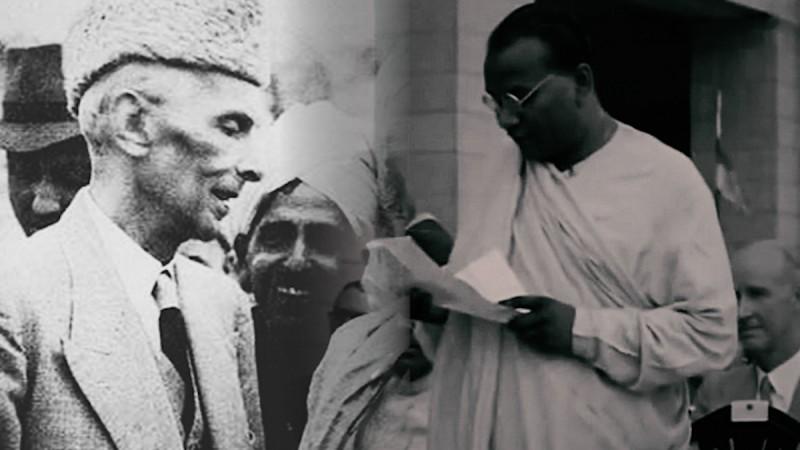
Imran Khan is about to form the government in Pakistan. Who his ministers are going to be is of no great interest to India. But 71 years ago, an Indian man had hauled himself over to Pakistan to become its first law minister when Muhammad Ali Jinnah formed independent Pakistan's first cabinet.
That man's name has been erased from India's consciousness. In one of the bitterest quirks of history, he has disappeared from Pakistan's national narrative as well. That man was Jogendranath Mandal, a towering scheduled caste leader from Kolkata, who played an instrumental role in getting Dr BR Ambedkar elected to India's Constituent Assembly.
As the leader of the Scheduled Class Federations (SCF) in Bengal, Mandal had closely associated with the Muslim League that ruled the pre-independence province. His support for Muslim League was not merely a political call, nor the least a religious one. Like Ambedkar himself, Mandal believed that the Dalits or Untouchables did not belong to mainstream Hinduism.
He realised that the Dalits and Muslims of the continent shared more or less the same destiny. As he saw around him, the plight of the Dalits and Muslims was similar in Bengal. Mandal was convinced that the future political space for Indian Dalits would be in Jinnah's 'secular' Pakistan, not in India.
Faith wave defeates ideology
How badly was he proved wrong! And how fast! How soon did Mandal's unshakable belief in the secular Pakistani Eldorado come crashing down! To his horror, he soon realised that his ideological dash was suicidal -- it had been defeated by a faith wave.
Mandal successfully fled the 'casteist and communal' India when the two nations were born in 1947. But the 'casteless' Pakistan he reached too soon became a theocracy. However, the backlash for him wasn't complete, just yet!
Mandal, a close follower of Jinnah, had a crucial role in the early days of Pakistan. He was second only to Jinnah at one time -- something that is hard to understand decades later. When Jinnah took oath as first Governor General of Pakistan, Mandal presided over the Assembly session. History says that Jinnah's move to give Mandal that role meant his status was that of a co-founder of the state.

When Jinnah formed the government, Mandal became the law minister. But Mandal's influence on Pakistan was miserably short-lived. The death of Jinnah -- whom Mandal considered as a more potent protector of Dalit rights than Jawaharlal Nehru and Mahatma Gandhi -- a year later changed Pakistan forever.
Patriotism questioned
Pakistan soon became an Islamic state under Prime Minister Liaqat Ali Khan. The Pakistani bureaucracy and the elite started questioning Mandal's place. Soon enough his patriotism was questioned. But what drove him ultimately despondent was the mindless violence unleashed against the Dalits in East Pakistan, present-day Bangladesh. Thousands of lower caste Hindus were massacred in East Pakistan in 1950. Mandal personally toured the regions and tried to reach official help, but failed.
"It is with a heavy heart and a sense of utter frustration at the failure of my lifelong mission to uplift the backward Hindu masses of East Bengal that I feel compelled to tender resignation of my membership of your cabinet," read the first sentence of Mandal's 8 October, 1950, extremely long resignation letter to Liaqat ali Khan.
Mandal laid down 36 specific reasons why he was quitting. Some of the cross-heads in his resignation letter were -- 'Hindus virtually outlawed', 'Forced conversions in western Pakistan', 'Pakistan accursed for Hindus', 'No civil liberty even for Muslims', 'Govt plans to squeeze out Hindus' and 'Anti-Hindu policy' etc.
He had already fled to Kolkata before officially quitting. He sent his resignation letter from Kolkata. Mandal tried to engage in social life by helping the riot-hit people and the Hindus, especially Dalits who were driven out of East Pakistan.
Campaign for Sylhet that India never forgot
However, the Indian patriots never forgave Mandal for his many anti-national sins. Well, from the Indian point of view muddled by the bloody partition, Mandal's sins were many. Particularly jagging was the way Mandal influenced the Dalits in Assam's Sylhet so that this region joined Pakistan.
The population of Muslims and Hindus was equal in Sylhet and there was greater chance that the district would remain with Assam, which was joining India. But under Jinnah's order, Mandal went there and campaigned among the large number of untouchables to support accession to Pakistan.
Thus, the backlash for Mandal was complete. A review of his resignation letter would reveal the tenacity with which he argued for 'Hindu rights' in Pakistan. But the Indian Hindus had already branded him a Pakistani, worse a Pak agent.
Mandal gave all his life to Pakistan, but the county threw him out and buried his brand of politics -- hook, line and sinker -- in less than two years. Back in India, Mandal lived the next 18 years of his life as a hate object. He died in 1968. As Akhtar Balouch wrote in Dawn some years ago, a famous Sindhi proverb encapsulates Mandal's life -- 'You have died for them, but they won't bother to attend your funeral.'

















